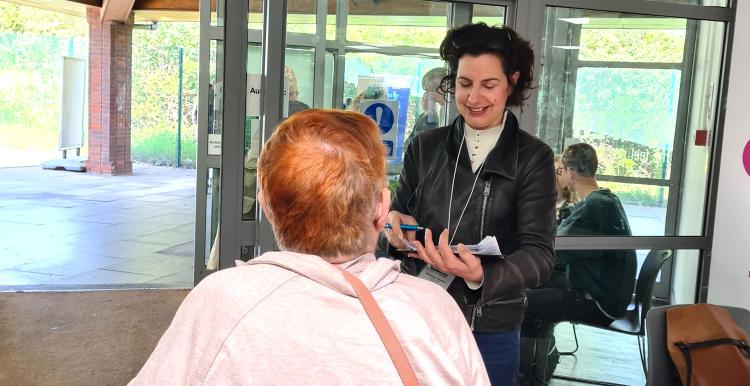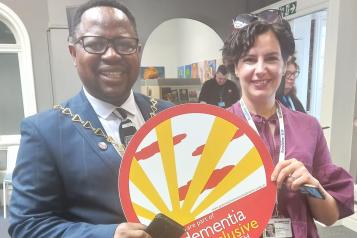What carers told us about dementia support

Caring for someone with dementia can be rewarding, but it can also be difficult, unpredictable, and isolating. Many carers are family members- spouses, adult children, or close relatives, who take on responsibilities without much preparation or training. They help with everyday tasks, provide emotional support, manage medication, and often coordinate care across multiple services.
During the event, carers' stories reflected a wide range of experiences. Some carers described strong support networks and helpful services. Others spoke about the difficulty of navigating complex systems and trying to get answers when things don’t go as planned. All of the carers who shared their views gave us a better understanding of what it’s like to support someone with dementia, and how services might better meet families’ needs.
Understanding carers’ experiences in a wider system context
When support makes a positive difference
Some carers said that local services had made a big difference to their family’s wellbeing, particularly when support was easy to access, consistent, and focused on their situation.
"I’m very grateful there are services like the [Greenwich] Carers Centre and Mind. They’ve made things easier for our family"
“Mum had good care for her dementia. We were lucky, she still recognised all of her daughters”
Carers appreciated services that offered emotional reassurance, practical help, and someone to talk to when they needed advice. When support is well organised and delivered with understanding, it can help families feel more confident and less alone in their caring role.
The period after a diagnosis feels unclear
Carers spoke about the moment of diagnosis as an important turning point, but not always in the way they expected. While getting a diagnosis helped explain certain behaviours, many carers felt that what came next was unclear.
"When he was diagnosed, I didn’t know anything about dementia. I was scared. He’s still living with me now, but I’m getting older, so I don’t know how long I can manage. I need information about what to expect, what options there are, and who to turn to when I can’t cope anymore”
This suggests a need for better support during the early stages after diagnosis. Carers want information that is not just clinical, but also practical and tailored to their situation, such as how the condition might progress, what support is available, and how to plan for the future. Having someone to guide them through these steps would help many carers feel less overwhelmed.
Communication and understanding matter
Some carers said they struggle to get clear answers from health professionals- when information is missing or confusing, it makes an already difficult situation harder.
“We need more support with medication. Doctors should explain what it’s for and the side effects. We’re not health professionals; we need information we can understand”
“Our GP stopped his blood pressure medication, but no one explained why… I keep asking, but I never get answers”
This highlights the need for clearer, simpler communication. Carers don’t expect to know everything, but they do want to be kept in the loop. They want explanations that are easy to understand and given in a way that respects their role and concerns.
Complex needs require flexible care
Carers described situations where dementia was not the only issue, their loved ones also had other health needs, mental health challenges, or past experiences that affected how care should be provided. In these cases, rigid rules or one-size-fits-all processes sometimes got in the way of safe, compassionate care.
“He used to drink a bottle of whiskey every day. When he moved into a care home, I told the manager he couldn’t stop all at once. I said she needed to speak to a doctor for medication, he needs to be weaned off. But she refused. She said alcohol is banned in the home. He became sick and aggressive. Now he’s in a different care home where they understand him. He’s getting the support he needs”
Flexibility and personalisation aren’t just nice to have, they’re essential when people’s needs don’t fit into the way things are usually done. Understanding the person behind the condition leads to better outcomes for carers and their loved ones.
What needs to change
-
Clearer support after diagnosis: Carers need early guidance about what dementia means, what support is available, and what they might need to plan for.
-
Better communication from services: Carers want clear explanations, especially about treatment decisions, changes in care, or medication.
-
Easier navigation of services: A named contact or care coordinator could help carers get the right support more easily.
-
Flexible, personalised care: Services need to consider the whole person, including taking into account other health issues, past experiences, or cultural needs.
-
Involving carers in decision-making: Carers want to be heard and recognised as key partners in care, not just visitors or bystanders.
What Healthwatch Greenwich is doing
-
Sharing what we heard with the NHS, Greenwich Council, care providers, and voluntary organisations.
-
Highlighting examples of services that carers found especially helpful, so that others can learn from them.
-
Pushing for better information and guidance after a dementia diagnosis.
-
Asking for clearer communication between professionals and families.
-
Encouraging services to do more to fully include carers in planning and review processes.

